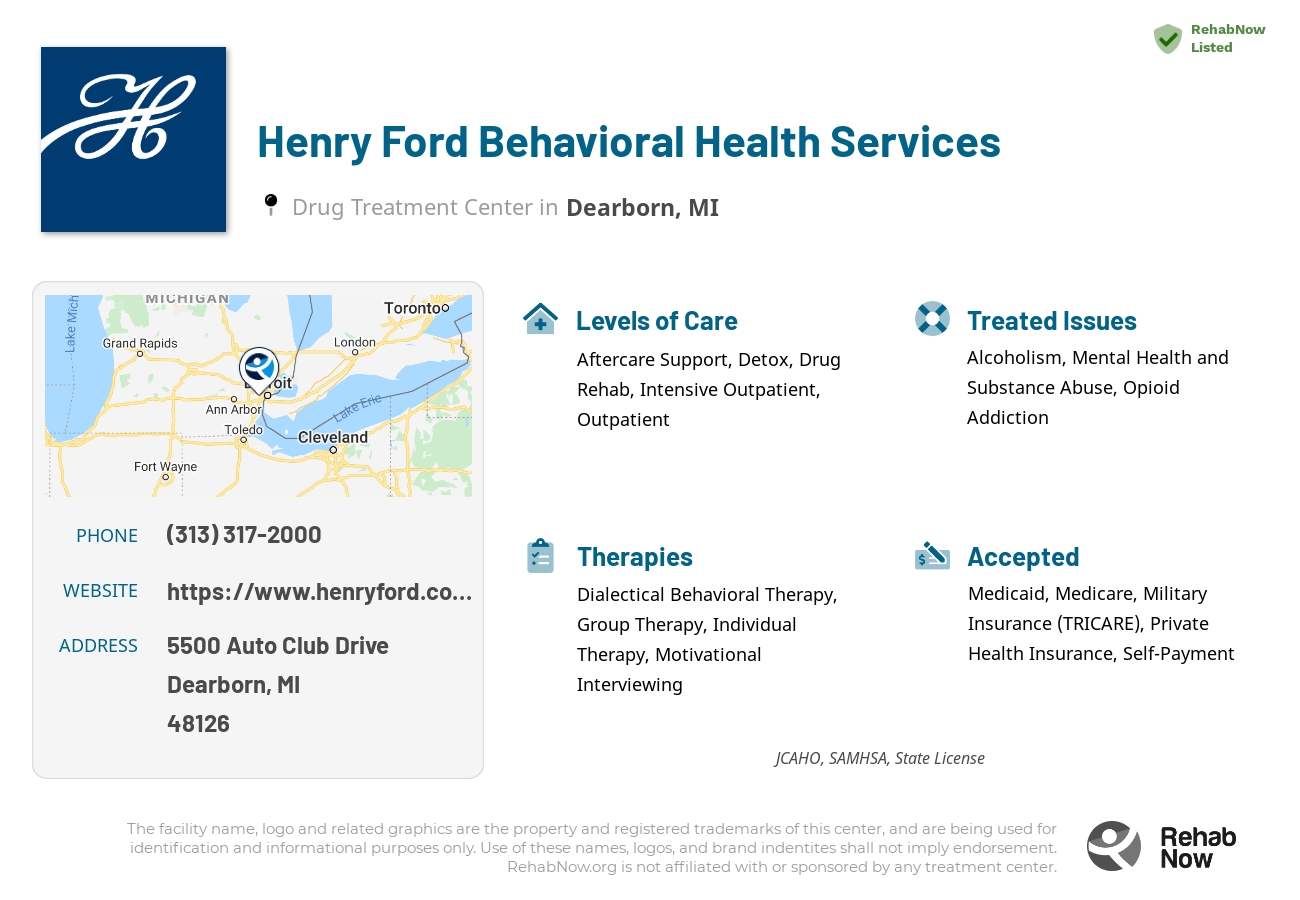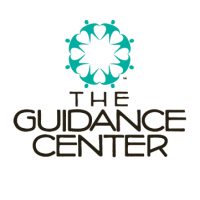Henry Ford Behavioral Health Services
Drug Rehab Center in Dearborn, Michigan
Henry Ford Behavioral Health Services in Dearborn, Michigan provides professional care for individuals suffering from substance abuse, addiction, and mental health issues with tailored programs, evidence-based therapies, and continuing support.
About Henry Ford Behavioral Health Services in Michigan
Henry Ford Behavioral Health Services, founded in 1915, is an Addiction Treatment Facility located in Dearborn, MI. Their mission is to provide comprehensive care and support for individuals suffering from various addictions, including alcoholism, dual diagnosis, opioid addiction, and drug addiction. This facility offers a range of treatment options to meet the diverse needs of their patients, including aftercare support, detox, drug rehab, intensive outpatient, and outpatient levels of care. Accredited by reputable organizations such as JCAHO, SAMHSA, and State License, Henry Ford Behavioral Health Services ensures that their services meet the highest standards of quality and safety. Additionally, they accept private health insurance, making their services accessible to a broader range of individuals in need. Affiliated with the renowned Henry Ford Health System, they have a strong foundation of medical expertise and a commitment to providing holistic care.
Henry Ford Behavioral Health Services provides a comprehensive range of services for addiction and substance abuse. Their detox program is designed to help individuals safely and comfortably withdraw from addictive substances while receiving medical supervision and support. The drug rehabilitation program offers evidence-based therapies and counseling to address the underlying causes of addiction and support long-term recovery. They also offer intensive outpatient treatment, which provides structured programming and support while allowing individuals to continue their daily routines. Additionally, their outpatient services provide ongoing care and support to individuals who have completed more intensive levels of treatment. With a focus on addressing the physical, psychological, and social aspects of addiction, Henry Ford Behavioral Health Services is dedicated to helping individuals regain control of their lives and achieve lasting recovery.
Genders
Ages
Modality
Additional
Accreditations
State License
SAMHSA

JCAHO
Conditions and Issues Treated
Opioid addiction treatment should be done in a medically supervised drug rehab. While taking opioids, users will typically use other substances to enhance the effects of opioids or to reduce the adverse effects of opioid use. Opioid addiction treatment will include detoxification and drug rehab counseling to help both the user and their loved ones learn how to live a successful sober lifestyle.
Treatments such as methadone, buprenorphine, and naltrexone are three medications that can help treat opioid addiction. These drugs work on the brain’s pleasure center and reduce cravings and the effects of illicit opioids such as heroin. These drugs can be either given orally or by injection. Individual drug rehab counseling sessions can be helpful to discuss any questions or concerns with the drug treatment program. This counseling will also help the user set goals for when they finish drug rehab.
Opioid addiction recovery is a long process. Many of the changes to the brain caused by opioid use cannot be undone, but with time and the proper treatment, a person can return to normal function. After detox, treatment will include drug rehab counseling and entering a halfway house or sober living community. Aftercare is critical to long-term recovery, as it helps the user avoid relapsing and entering back into drug rehab.
Levels of Care Offered
This center offers a variety of custom treatment tailored to individual recovery. Currently available are Aftercare Support, Detox, Drug Rehab, Intensive Outpatient, Outpatient, with additional therapies available as listed below.
An addict may have to go through alcohol or drug withdrawal. While detox may be uncomfortable, it is not life-threatening. Detoxification allows the addict to rid the body of all traces of drugs or alcohol and gives the addict a clean slate for their recovery. In an inpatient or outpatient setting, detox can be managed medically.
Intensive outpatient treatment is a type of comprehensive addiction care. Unlike conventional residential treatment programs, the patients live at home during the recovery process. This means that one can continue working and caring for their families. These also allow people to keep pursuing their studies while also working on their sobriety.
Outpatient treatment can help one transition to normal life from the round-the-clock supervision and treatment available during inpatient treatment. It is an excellent tool to ensure long-term recovery. However, it is essential to note that intensive outpatient treatment in itself does not remove patients from the real-world setting. This means there’s always a higher risk of coming across environmental triggers. To further prevent relapse, an outpatient treatment center should be able to provide ongoing support services.
Once the patient is enrolled in an intensive outpatient treatment program, they will be expected to attend therapy and group meetings daily for a stipulated period. The frequency and duration of each session will depend on the patient’s needs and level of addiction. This can help curb the habit and deal with underlying issues that led to it. Most of these professional treatments are designed to allow patients to structure their daily schedules in a way that is conducive to recovery.
“Outpatient treatment is ideal for those who have a lower intensity addiction. It’s also suitable for those with a supportive environment and those on a tight budget.
Outpatient treatment can be considered the lowest intensity level of addiction treatment. It is ideal for early phase addiction or lower intensity addictions. It may involve weekly sessions instead of daily. Peer group support, 12-step programs, and individual counseling may still be used and anti-addiction medication.
Aftercare support is vital to those who have completed a drug or alcohol treatment program. This support comes in individual and family counseling, treatment of psychiatric and other medical conditions, and medications to reduce cravings. It helps recovering addicts adjust to normal day-to-day activities and can last for a year or longer.
The majority of drug and alcohol addicts who receive aftercare treatment do not relapse. It is estimated that without aftercare, the relapse rate will be between 70 to 90 percent for most people. Aftercare is the final stage in addiction recovery, but it will also help maintain sobriety if relapse does occur.
Therapies & Programs
No single treatment works for all addicts; therefore, the goal of treatment and therapy should be to find what works best for each individual. Some people requiring addiction treatment may only need a few weeks of inpatient care. Others will require long-term residential care. Tolerance and withdrawal levels vary from person to person and thus affect the intensity of the treatment needed.
If an individualized approach to treatment and therapy is not offered, addicts may fail to reap benefits from their efforts. Professionals must customize plans according to their patient’s needs, limitations, and strengths. The goal of all forms of addiction treatment should be for addicts to find healthy ways to cope with their addiction and its underlying causes.
Group therapy is held in a safe, controlled setting where patients can feel comfortable sharing their struggles and gaining perspective through shared conversations. It takes place in a group rather than one on one to prevent feelings of isolation or being unique in their situation while creating an environment for addicts at Henry Ford Behavioral Health Services to develop fellowship, accountability, and support. Group therapy is an important tool in recovery that prevents cravings that prompt a return to active addiction.
Dialectical Behavior Therapy is a form of Cognitive Behavioral Therapy that helps patients understand the relationship between their thoughts, feelings, and behaviors. It is beneficial for those whose addictions and behaviors stem from severe mental health issues. It aims to help the patient achieve their goals and identify how they can enhance their lives.
Cognitive-behavioral therapy is a talking-based method that helps people struggling with addiction replace destructive behaviors with healthier ones. CBT also helps them identify the underlying thoughts and beliefs that cause these behaviors in the first place and ways to control those thoughts and feelings. It can be administered as a holistic therapy or as part of combination therapy and—as opposed to turning to drugs and alcohol—helps addicts learn how to respond to negative thoughts instead.
Payment Options Accepted
For specific insurance or payment methods please contact us.
Is your insurance accepted?
Ask an expert, call (888) 674-0062
Henry Ford Health System Associated Centers
Discover treatment facilities under the same provider.
- Henry Ford Allegiance - Addiction Recovery Center in Jackson, MI
- Henry Ford Health System in West Bloomfield, MI
- Henry Ford Health Systems - Maplegrove Ctr for Chem Dependency in West Bloomfield, MI
- Henry Ford Behavioral Health - Seville in Clinton Township, MI
- Henry Ford Allegiance Neuropsychology in Jackson, MI
Learn More About Henry Ford Health System Centers
Additional Details
Specifics, location, and helpful extra information.
Dearborn, Michigan 48126 Phone Number(313) 317-2000 Meta DetailsUpdated November 25, 2023
Staff Verified
Henry Ford Behavioral Health Services Patient Reviews
There are no reviews yet. Be the first one to write one.
Dearborn, Michigan Addiction Information
Michigan has the second-highest rate of drug and alcohol abuse in the nation. Heroin is linked to more than 50% of the state's hepatitis C cases. Marijuana is the drug most often associated with crimes in Michigan, followed by methamphetamines. Opioids alone are responsible for almost 20% of all drug overdose deaths in Michigan.
Over 18,000 individuals suffered from substance use disorders in Dearborn County in 2014. 11.4% of residents aged 12 and older used illicit drugs. Heroin was the drug most commonly involved in fatal overdoses (746 deaths), followed by fentanyl (362) and cocaine (290). The programs in Dearborn offer more comprehensive care, usually including detox. No matter what type of facility you choose, ensure that the staff is experienced and certified in addiction counseling.
Treatment in Nearby Cities
- Manistique, MI (292.5 mi.)
- Redford, MI (6.0 mi.)
- Cheboygan, MI (237.9 mi.)
- Menominee, MI (291.8 mi.)
- Reed City, MI (157.5 mi.)
Centers near Henry Ford Behavioral Health Services
The facility name, logo and brand are the property and registered trademarks of Henry Ford Behavioral Health Services, and are being used for identification and informational purposes only. Use of these names, logos and brands shall not imply endorsement. RehabNow.org is not affiliated with or sponsored by Henry Ford Behavioral Health Services.












